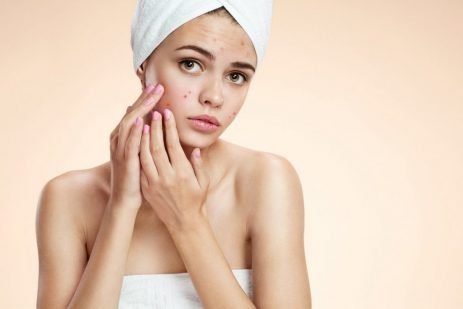What Causes Acne
Acne is a common but complex skin condition that can occur in people of all ages.
Acne – spots and oily skin – is caused by blocked hair follicles. Often there are several contributing factors that cause acne to occur. It can be difficult to determine which factor is most important for each individual but, as this can alter which treatments you respond best to, it is useful to understand these exacerbating factors as well as your family history.

Bacteria
Propionibacterium acnes (C. acnes) is the bacteria that live on all skin types inside the hair follicles. The bacteria flourishes rapidly in people who have higher oil levels on their skin. It is common for acne to appear in areas such as the face, chest and back as this is where sebaceous glands are most densely concentrated.
Genetics
Most conditions in medicine are caused by a mixture of genetic and environmental factors. There is a strong link between acne and genetics, with studies demonstrating that people who have a first degree relative who had severe acne have four to five times greater likelihood of developing acne as a teen or adult.
Menstruation and Hormonal Influence
Women are more likely to have adult acne than men. Many women report that acne gets worse before or during their menstrual cycle. During this time of the month the oestrogen and progesterone hormone levels begin to decrease, which results in testosterone being relatively higher. This may lead to a flare up of acne at this time.
Pregnancy
Acne can commonly occur in pregnant women, but then acne is generally a common condition. There is no real consensus as to whether pregnancy makes acne worse or better as both situations have been reported in medical literature. What is clear is that acne treatment options are more limited in pregnancy.
Medical Conditions
Acne in women can sometimes be linked to systemic diseases such as polycystic ovary syndrome (PCOS). This is a condition which causes acne in women as well as excess hair growth, irregular periods and weight gain. In PCOS the levels of testosterone are increased. The greater the testosterone levels, the more oil is produced in the sebaceous glands, which can cause the hair follicles to block and acne to develop.
Cosmetics
Some beauty, skincare and hair products can block pores, particularly if they are not removed effectively at the end of the day. If you have a predisposition toward acne, choose light, non-comedogenic products that are water-based and free from oils.
Stress
Stress can make acne worse and acne itself can be a cause of stress. There are a number of medical studies that shows acne can worsen with stress, and psychological stress is the most common external factor that affects acne. The link between stress and acne may be due to the hypothalamic–pituitary–adrenal axis. This is the name of the hormonal pathway that is an integral part of the body’s stress response. Stressful events will trigger activation of the hypothalamic–pituitary–adrenal axis which will result in an increase in CRH (corticotropin-releasing hormone). CRH in turn has been shown to affect the cells in the skin that produce sebum (oil) which in turn will affect acne.
\Not only can acne be made worse by stressful life events, but acne itself can be a cause of stress. The psychological impact of acne is significant and often underestimated, the stress caused by acne tends to be worse in adults than in teenagers.
Medication
There are several medications which have been reported to cause acne. These include some antidepressants, antipsychotics, anticonvulsants, antituberculosis and antiviral drugs, to name a few. Steroids, which if used by any route (oral medication or ointments/creams), can also induce acne..




